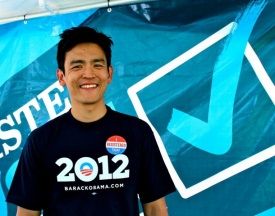Will failed Prop. 209 rollback help GOP with Asian voters? It depends
by Chris Reed | March 19, 2014 6:00 am
 With Asian-Americans making up 14 percent of the state’s electorate, there is a small but real chance that this past month’s developments in the Legislature could prove the biggest story in California politics in years. I refer to Asian Democratic lawmakers pulling their support from the usual broad Democratic coalition’s push to to use a ballot initiative to go back to the pre-Prop. 209 days on college admissions.
With Asian-Americans making up 14 percent of the state’s electorate, there is a small but real chance that this past month’s developments in the Legislature could prove the biggest story in California politics in years. I refer to Asian Democratic lawmakers pulling their support from the usual broad Democratic coalition’s push to to use a ballot initiative to go back to the pre-Prop. 209 days on college admissions.
These didn’t pull any punches, echoing what they were hearing from their constituents: Asian parents didn’t want racial quotas keeping their deserving kids out of the UC and CSU campuses of their choice. Their framing: What you define as “social justice” is punishing Asians in the name of atoning for historical white racism.
But will this sharp single-issue split lead to an Asian political realignment? Or just to a shakier Democratic coalition in which Asian-Americans are still largely reliable members?
The latter is far more likely because of how damaged the GOP brand is with Asian-Americans. A new Politico analysis[1] written by three academics opens with the painful account of Kansas Republican Sen. Pat Roberts’ awkward, patronizing and goofy comments to an Indian-American doctor nominated by President Obama to be surgeon general, then says the following:
“… this is exactly the sort of exchange that makes Asian Americans — the fastest growing ethnic group in the country — more likely to identify themselves as Democrats than Republicans, and by stunning margins. In the 2012 presidential election, Barack Obama won 73 percent of the Asian American vote, exceeding his support among Hispanics (71 percent) and women (55 percent).”
If GOP can’t understand problem, that’s telling
Politico points out something that I find amazing: Republicans …
“… seem generally mystified as to what they might be doing wrong. … Asian Americans as a group have certain characteristics that would ordinarily predict a Republican political affiliation, most strikingly their level of income, which on average, is higher than any other ethnic group in the United States. …
“Other conservatives have pointed to less tangible characteristics of Asian Americans, such as an emphasis on discipline in child rearing and a penchant for entrepreneurship, that ought to make them Republicans. ‘If you are looking for a natural Republican constituency, Asians should define “natural”,’” notes the American Enterprise Institute’s Charles Murray. “And yet something has happened to define conservatism in the minds of Asians as deeply unattractive.”
Yes, “something has happened,” but it’s hardly a mystery. Republicans are perceived as looking down on nonwhites. GOPers may say it’s unfair, but nothing else explains their huge underperformance with Asian voters. The academics agree, and offer some hard evidence, not just anecdotes.
“First, there’s race. The feeling of social exclusion stemming from their ethnic background might push Asian Americans away from the Republican Party. Many studies, like Henri Tajfel and John Turner’s work on the psychology of intergroup relations, have shown that one’s identification with a broad category of people—be it on the basis of language, ethnic or racial solidarity or some other trait—is important politically. Republican rhetoric implying that the (non-white) ‘takers’ are plundering the (white) ‘makers’ has cultivated a perception that the Republican Party is less welcoming of minorities. …
“And many Asian-Americans do feel like they don’t get equal treatment. According to the 2008 National Asian American Survey, nearly 40 percent of Asian Americans suffered one of the following forms of racial discrimination in their lifetime: being unfairly denied a job or fired; unfairly denied a promotion at work; unfairly treated by the police; unfairly prevented from renting or buying a home; treated unfairly at a restaurant or other place of service; or been a victim of a hate crime. We found that self-reported racial discrimination was positively correlated with identification with the Democratic Party over the Republican Party.”
Making the case for Kashkari: 2 plus 2 is 4
 Now if this doesn’t make it obvious to California Republicans that letting Neel Kashkari be their gubernatorial candidate for the inevitable November GOP loss to Jerry Brown, nothing will. I wish he didn’t vote for Obama[2] in 2008 and I wish he didn’t see his role as “bailout czar” in the big-government TARP (Troubled Asset Relief Program) as such a badge of honor.
Now if this doesn’t make it obvious to California Republicans that letting Neel Kashkari be their gubernatorial candidate for the inevitable November GOP loss to Jerry Brown, nothing will. I wish he didn’t vote for Obama[2] in 2008 and I wish he didn’t see his role as “bailout czar” in the big-government TARP (Troubled Asset Relief Program) as such a badge of honor.
But if you want Asian-Americans in California to take a fresh look at the GOP — and if you’re a Republican, you do, you do, you do — then the political math is about as difficult as two plus two equals four.
Strategery: Sometimes you just have to go there.
- Politico analysis: http://www.politico.com/magazine/story/2014/03/asian-americans-democrats-104763.html?ml=m_pm#.UykR6oWwX3B
- vote for Obama: http://blog.sfgate.com/nov05election/2013/11/14/excloo-republican-neel-kashkari-edging-closer-to-2014-gov-run-on-the-issues/
Source URL: https://calwatchdog.com/2014/03/19/will-failed-prop-209-rollback-help-gop-with-asian-voters-it-depends/